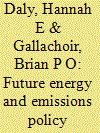| Srl | Item |
| 1 |
ID:
116924


|
|
|
|
|
| Publication |
2012.
|
| Summary/Abstract |
In this paper we use a technological model of Ireland's future car stock to simulate the impact of a range of policy measures on the baseline trend in energy demand in the period to 2030. The policies and measures modelled comprise meeting deployment targets for electric vehicles and compressed natural gas vehicles, an EU regulation for the improvement of vehicle efficiency, implementation of a national biofuel obligation, as well as several behavioural measures (encouraging modal shifting and reduced travel demand). The impact of the different measures simulated is measured in terms of their contribution to meeting Ireland's ambitious targets for energy savings, for renewable energy penetration and for greenhouse gas (GHG) emissions reductions. The results point to a possible improvement of 32% in car stock efficiency, the achievement of 7.8% renewable energy share of road and rail transport and a 22% reduction in non-ETS private car CO2 emissions relative to 2009 levels. A scenario analysis on meeting the EV penetration target shows a significant range of CO2 emissions reductions depending on the cars (and mileage) displaced and on the electricity generation portfolio.
|
|
|
|
|
|
|
|
|
|
|
|
|
|
|
|
| 2 |
ID:
111321


|
|
|
|
|
| Publication |
2012.
|
| Summary/Abstract |
Despite an emerging consensus that societal energy consumption and related emissions are not only influenced by technical efficiency but also by lifestyles and socio-cultural factors, few attempts have been made to operationalise these insights in models of energy demand. This paper addresses that gap by presenting a scenario exercise using an integrated suite of sectoral and whole systems models to explore potential energy pathways in the UK transport sector. Techno-economic driven scenarios are contrasted with one in which social change is strongly influenced by concerns about energy use, the environment and well-being. The 'what if' Lifestyle scenario reveals a future in which distance travelled by car is reduced by 74% by 2050 and final energy demand from transport is halved compared to the reference case. Despite the more rapid uptake of electric vehicles and the larger share of electricity in final energy demand, it shows a future where electricity decarbonisation could be delayed. The paper illustrates the key trade-off between the more aggressive pursuit of purely technological fixes and demand reduction in the transport sector and concludes there are strong arguments for pursuing both demand and supply side solutions in the pursuit of emissions reduction and energy security.
|
|
|
|
|
|
|
|
|
|
|
|
|
|
|
|
| 3 |
ID:
111320


|
|
|
|
|
| Publication |
2012.
|
| Summary/Abstract |
Current debate focuses on the need for the transport sector to contribute to more ambitious carbon emission reduction targets. In the UK, various macro-economic and energy system wide, top-down models are used to explore the potential for energy demand and carbon emissions reduction in the transport sector. These models can lack the bottom-up, sectoral detail needed to simulate the effects of integrated demand and supply-side policy strategies to reduce emissions. Bridging the gap between short-term forecasting and long-term scenario "models", this paper introduces a newly developed strategic transport, energy, emissions and environmental impacts model, the UK Transport Carbon Model (UKTCM). The UKTCM covers the range of transport-energy-environment issues from socio-economic and policy influences on energy demand reduction through to life cycle carbon emissions and external costs. The model is demonstrated in this paper by presenting the results of three single policies and one policy package scenario. Limitations of the model are also discussed. Developed under the auspices of the UK Energy Research Centre (UKERC) the UKTCM can be used to develop transport policy scenarios that explore the full range of technological, fiscal, regulatory and behavioural change policy interventions to meet UK climate change and energy security goals.
|
|
|
|
|
|
|
|
|
|
|
|
|
|
|
|